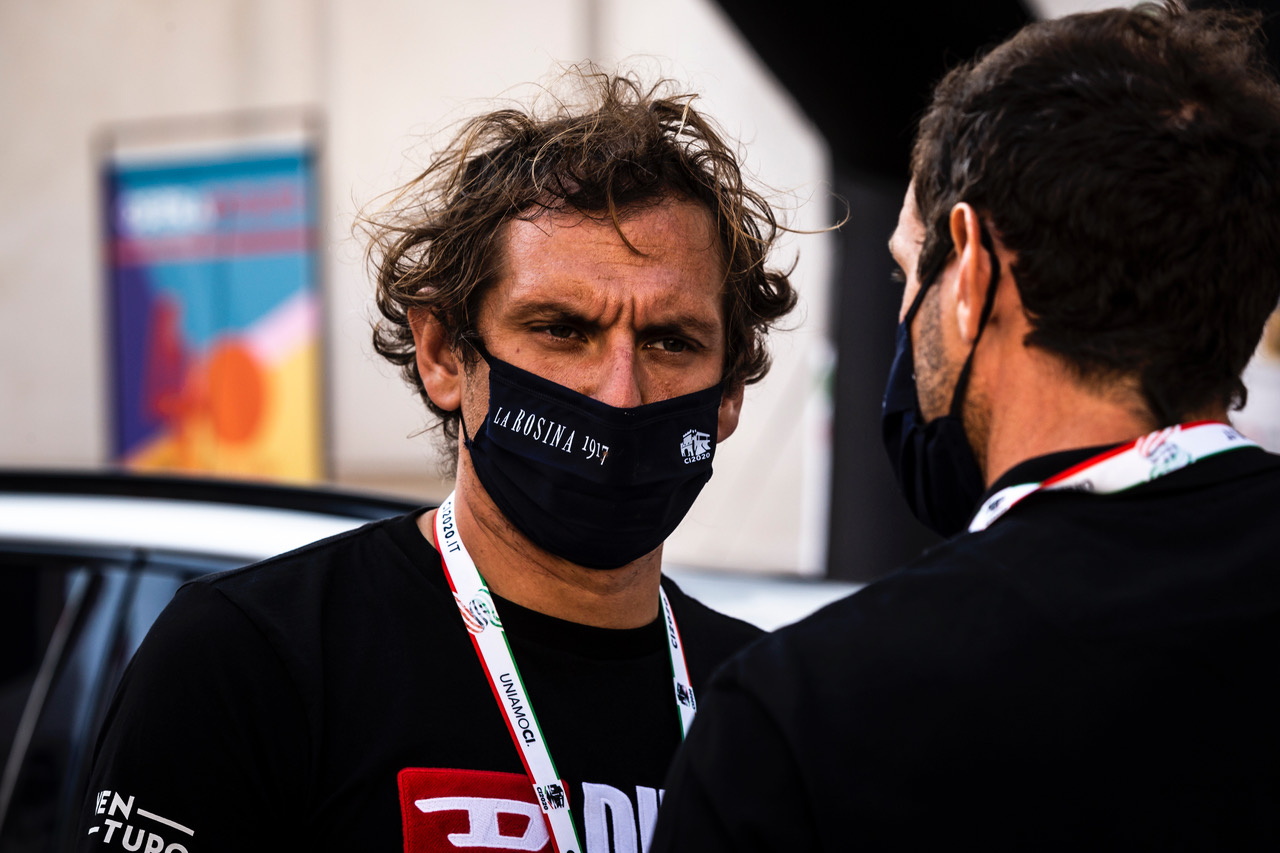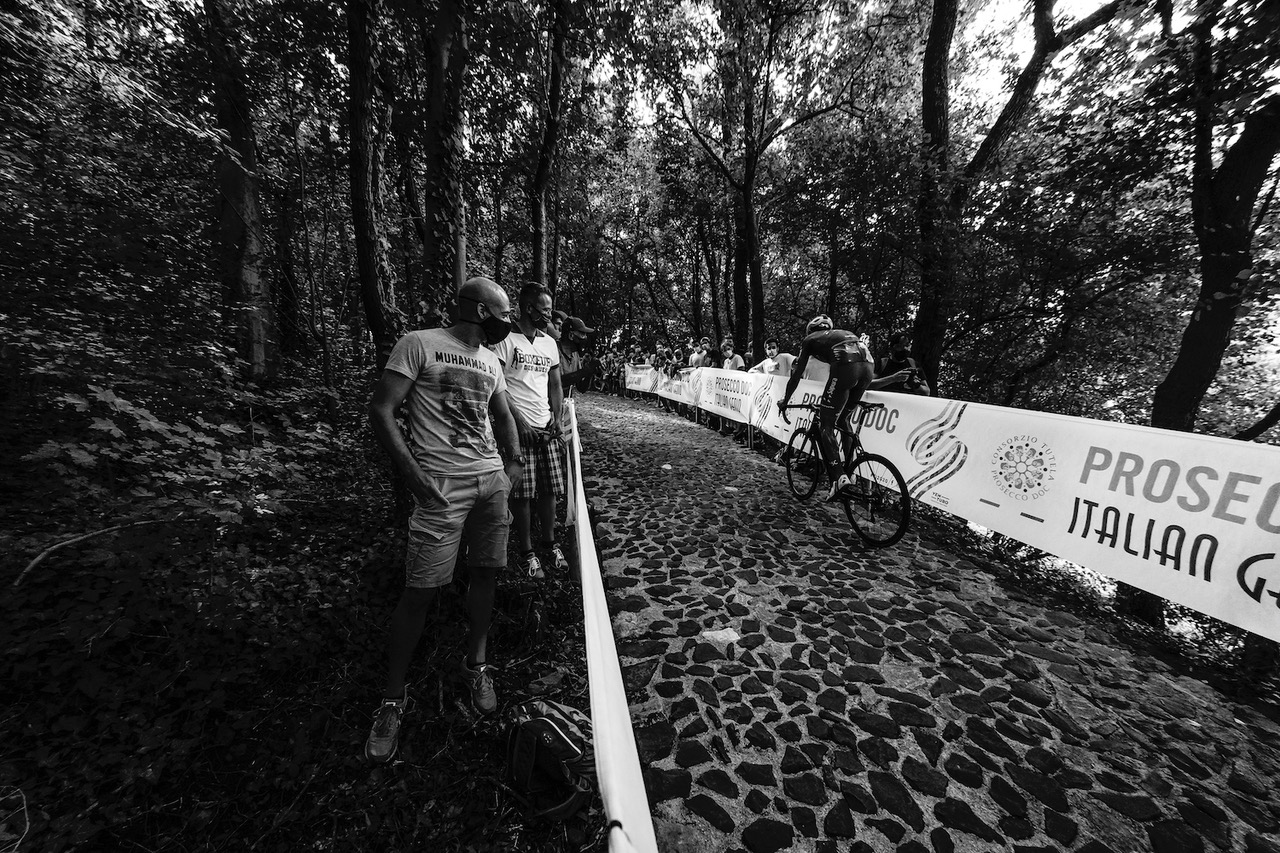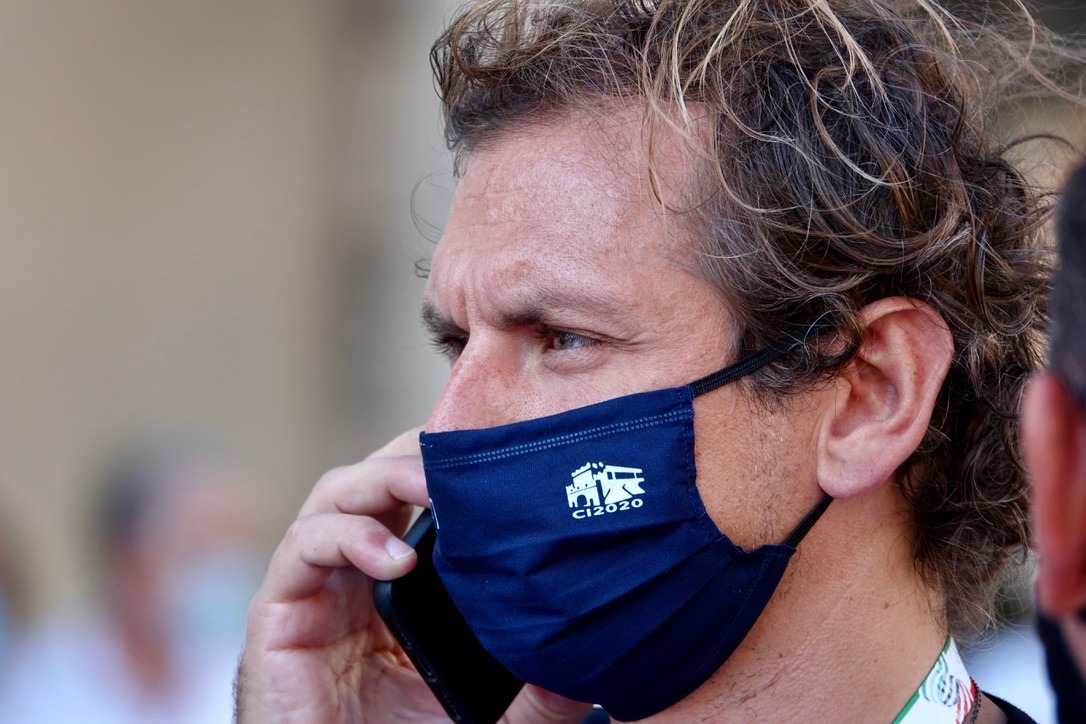Filippo Pozzato: We can't take pressure out of bike racing, but we can make it more human
Italian former pro on organising the Giro del Veneto and new gravel race for professionals this October

When Filippo Pozzato answers the phone, there is the faint sound of drilling in the background. He’s speaking from the office at Meccanica Sandrigo, on the outskirts of Vicenza, where he serves as the CEO. The company was part-owned by his late father, Carlo, and Pozzato took up his position last year, just as the coronavirus pandemic swept across northern Italy, emptying the factory floor and stifling demand for its products.
“I was able to do everything I did as a rider because my father made sure I never wanted for anything. So when he died, I told my mother it would be sad to sell everything. I said I would take it on and try to modernise it a bit,” Pozzato tells Cyclingnews.
“Then COVID-19 hit just as I was coming in and it was a real disaster… But I’m a cyclist and you never give up even when things are going really badly. Since then, we've set ourselves an objective and we’ve worked at it. We’re still not where I’d want us to be but we’re on the right road. For next year, we’ll be really well set up.”
In 19 seasons as a professional rider, Pozzato wore the jerseys of many teams – from Mapei to Fassa Bortolo, from Liquigas to Vini Fantini – and now in retirement, he wears several hats.
His work in his native Veneto is not limited to the fabrication of agricultural components. Next month, his other company, PPsportevents, will revive the Giro del Veneto one-day race for the first time since 2012 as part of an end of season festival of cycling from October 13-17 that incorporates a gravel race for professionals, a Gran Fondo for amateurs and, as a grand finale, a new race called the Veneto Classic, which Pozzato hopes will become his region’s answer to Strade Bianche.
“People who come to Italy might know about Tuscany, but they mightn’t know all of the Veneto, which, in my opinion, is more beautiful and one of the best places to ride a bike, too. We wanted to create a classic to show off this region,” says Pozzato, who made his debut as a race organiser last August by running the Italian national championships in his native region.
In the aftermath of that event, Pozzato was asked to take over the reins of the Giro del Veneto and his original idea for the Veneto Classic expanded in scope from a single event to a series.
Get The Leadout Newsletter
The latest race content, interviews, features, reviews and expert buying guides, direct to your inbox!
“I was discussing it with Jonny Moletta, who works with me, and we said ‘why not put on a gravel race for the road professionals as well?’ Nobody has done that before,” says Pozzato.
“And then we thought of a Gran Fondo for amateurs the day before the Veneto Classic, in the same way they do it at the Tour of Flanders.”
All told, Pozzato will organise four events across five days in mid-October, in the week after Il Lombardia, though in the future, the idea is to hold the series in September as part of the build-up to the World Championships.
“For this year there weren’t many free dates. The UCI gave us the option of July but I didn’t want to do it then because there’s the Tour de France and the strongest riders aren’t available,” he says.
The Giro del Veneto thus kicks off the series on Wednesday, October 13 on a hilly route that respects the race’s traditions with a finish in Padova. Two days later, the professionals will line up again, this time on gravel, for the novel Serenissima Gravel. The amateur Granfondo VENEtoGO takes place on the Saturday before the inaugural Veneto Classic brings the curtain down on the series – and the European road season – on Sunday, October 17.
“I’d like to bring the Veneto Classic to WorldTour level. The UCI don’t usually give you that status within the first three years, but we’re working on it,” Pozzato says of a race that will start in Venice.
“We go into the Prosecco hills, then past the Antonio Canova museum and into the hills around Asolo. After that, we’ll finish in Bassano del Grappa with a circuit that goes out to Marostica via the famous climb of the Rosina, which we’ll go over twice.
"We’re trying to make a course that allows spectators to watch the race multiple times, a bit like what the Tour of Flanders has done. The idea is to create a sort of stadium atmosphere."

Gravel
While the nascent Veneto Classic is, by Pozzato’s own admission, the event to which he is most attached, the preceding Serenissima Gravel is perhaps the most intriguing to an outside audience.
Gravel racing has experienced remarkable growth in recent years, and more and more WorldTour professionals have been tempted to sample the scene, most notably in the United States. This is the first such event that has been created expressly for road professionals and the route will be tailored accordingly.
“We’re not going to be like other gravel races, with long distances, because you can’t have the pros doing an endurance race of 300 kilometres, so we’ll make it short, but a bit more spectacular, with a finishing circuit where the spectators can see it five or even six times,” says Pozzato.
“The finish is at Villa Contarini in Piazzola sul Brenta, which has hosted lots of concerts and shows. The idea is to distribute the bib numbers for the next day’s Gran Fondo there, too, so it will create a kind of festival atmosphere.”
Pozzato has built the event, though it is as yet unclear who will come to ride it. The invitations were distributed to WorldTour and Pro Continental squads in late August, and there ought to be a clearer picture of the lineup by the time the events are formally presented in Venice later this month.
“I’m talking with the teams at the moment, but the idea is to bring important riders so the race starts with a good image,” he says.
“The riders are certainly interested, because they find it fun to race on gravel, and bike manufacturers have a big interest in creating gravel races because it’s the sector of the market that’s growing more than any other.”
In recent seasons, professionals have increasingly taken to gravel seemingly as a release from the rigours and constraints of WorldTour racing, and Peter Sagan’s schedule at Total Direct Energie is expected to incorporate an increasing number of off-road events.
As the discipline grows in popularity, however, its originally loose parameters are tightening into something more obviously competitive, with the UCI interested in creating an official gravel World Championships.
Pozzato, for his part, is aware of the importance of trying to maintain the discipline’s more relaxed spirit and incorporating it, where possible, into road events. The early retirement of Fabio Aru and Tom Dumoulin’s sabbatical were just two of the most obvious, recent examples of the almost unsustainable demands imposed by modern cycling.
“Riders aren’t stopping because they’re tired physically. They’re stopping because they’re disintegrating mentally, because there’s maximum attention on everything: performance, training, nutrition. Every race is flat-out from start to finish,” Pozzato says.
“The strongest must always win, of course, but we can’t allow ourselves to consume people like this. Everybody wants to get the most out of every rider for as long as he can provide it, but then they just cast them aside and take on another. We need to safeguard them more by creating a more fun and carefree sort of approach.
“But then, if I had a team and was paying riders, I’d want them to win too, and to do that, they have to be on the same level as everyone else, which means working like everyone else, so you’re back in that vicious circle…”
As a race organiser, Pozzato at least makes a point of engaging with the riders themselves. Ahead of last year’s Italian championships, he consulted with men like Alberto Bettiol and Matteo Trentin about the fine details of the route and modified it accordingly.
“It’s clear that a bike race is still a bike race, and we can’t take out competition or pressure, but if we can have a dialogue with the riders, then maybe they’ll be more carefree and enjoy themselves more,” he says.
“It maybe seems too simple or easy to say these things, and it’s certainly not that I’m going to change the world, but I would like to loosen things up a little bit, so that it’s more human, so to speak.”

Venice
During the latter part of Pozzato’s racing days, he regularly spoke wistfully of his time at Mapei, where he began his career in 2000 having made the contentious decision to skip the amateur ranks altogether and graduate directly from junior level to the professional peloton.
By the time Pozzato brought the curtain down on his professional career in late 2018, Italy no longer had a single WorldTour team, and he hinted strongly at his desire to rectify that anomaly.
In the intervening period, Pozzato’s involvement in cycling has been focused on rider management, with his former teammate Luca Mazzanti and his new calling as a race organiser, but the original ambition intention intact.
“One of my dreams is to have an Italian WorldTour team, and I’m working a bit towards that by organising races that could bring sponsors into cycling by stoking their passion for it,” he says.
“It’s hard to go and ask for 20 million Euro to start a team if you haven’t got experience behind it. And these days, if you want to bring big companies back into cycling sponsorship, I think you have to go about it differently to before.”
An apparent predestinato as a junior, Pozzato won Tirreno-Adriatico as a 21-year-old and amassed a palmarès that included wins at Milan-San Remo (2006), Omloop Het Volk (2007) and E3 Harelbeke (2009), but in the second half of his career, he often came to be derided for being the nearly-man of Italian cycling and for failing to live up to that early promise. His candour and propensity for tongue-in-cheek social media postings only fuelled criticism further.
A tendency towards cautious overthinking may have proved costly in major races, but ambition was rarely lacking then, and it doesn’t appear to be missing now either.
The Veneto Classic may be in its infancy, but Pozzato has a grand vision for its future, perhaps in the manner of the novel Venetian time trial of the 1978 Giro d’Italia, when a pontoon bridge was created to allow the stage to finish in the city’s most evocative square.
“In two or three years, the idea is to start the Veneto Classic right on Piazza San Marco,” Pozzato says. “It would be one of the most beautiful images you could have for a bike race.”

Barry Ryan was Head of Features at Cyclingnews. He has covered professional cycling since 2010, reporting from the Tour de France, Giro d’Italia and events from Argentina to Japan. His writing has appeared in The Independent, Procycling and Cycling Plus. He is the author of The Ascent: Sean Kelly, Stephen Roche and the Rise of Irish Cycling’s Golden Generation, published by Gill Books.